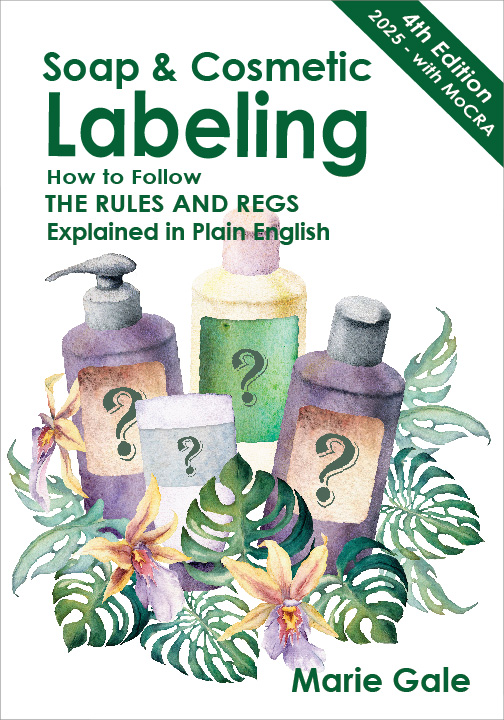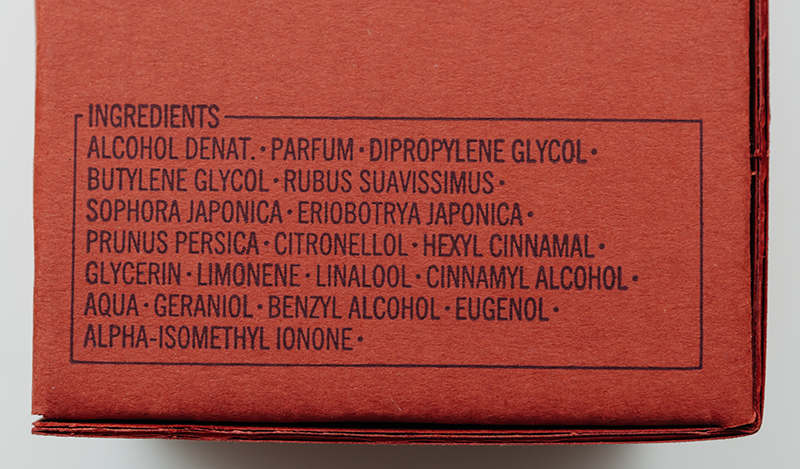“If you put one ingredient on your soap label, you have to list them all” is an idea is being bandied around a lot lately. But is it true?
As with most questions about legal stuff and regulations, yes… and no.
Cosmetics
If the product is a cosmetic, then the answer is a resounding YES.
Not only do you have to list all the ingredients if you list one, you must list all the ingredients, period.
Soap
If the soap is regulated as a cosmetic (that is, the soap is NOT exempt from the definition of a cosmetic) then the cosmetic regulations apply. Again, the answer to “Do you have to list all the the ingredients?” is absolutely YES.
The place where the “yes… and no” comes into play is for soap that is exempt from the definition of a cosmetic.
In its definition of the term cosmetic, the Federal Food Drug, and Cosmetic Act specifically excludes soap. The term soap is nowhere defined in the Act. In administering the Act, the Food and Drug Administration interprets the term “soap” to apply only to articles that meet the following conditions:
Directly from the regulations:
- (1) The bulk of the nonvolatile matter in the product consists of an alkali salt of fatty acids and the detergent properties of the article are due to the alkali-fatty acid compounds; and
- (2) The product is labeled, sold and represented only as soap.
Cite
When a soap is exempt from the definition of a cosmetic, then it is not regulated by the FDA; it is regulated by the Federal Trade Commission (FTC) for labeling and advertising, and by the Consumer Product Safety Commission (FTC) for safety. The FDA doesn’t have jurisdiction over non-cosmetic soap, so their regulations about what has to be included in an ingredient declaration don’t apply to soap when it’s not a cosmetic. The FTC doesn’t say anything about if or how an ingredient declaration has to be done.
That’s where answering the question, “If you list one ingredient, do you have to list them all?” gets tricky. If it’s soap you are talking about, there aren’t any regulations which say that if you list one ingredient you have to list them all. So technically, the answer is no.
So what’s to stop someone from, for example, listing just “olive oil” in the ingredient list for their soap?
False and Misleading
The FTC does have regulations that state that the label (and promotional materials) cannot be false or misleading. So even if the soap doesn’t technically require that cosmetic ingredient declaration regulations be followed, you still can’t present information in a false or misleading way. Consumers have come to expect certain information in a certain format on products. They don’t understand the that there could be a difference between the label requirements for soap and for cosmetics.
If you say “Ingredients: ____ ” in a way that LOOKS like it should include all the ingredients (because that’s what a consumer expects) and then intentionally leave out some ingredients because they aren’t good selling points, that would be false or misleading.
If you say “Ingredients: ____ ” so the consumer thinks it is a standard ingredient list and everything is in descending order of predominance, but you re-order the list so your 1% of shea butter is a the top of the list, making it look like it’s mostly shea butter, that would be false or misleading.
On the other hand, if you tell what’s in your soap in a “conversational manner” so the consumer doesn’t think that it’s an “official ingredient declaration” you have a little more wiggle room. When you say something along the lines of, “We make our soaps with a unique blend of seven plant-based oils, including olive, macadamia nut and jojoba,” the customer can instantly see that this is not an official “ingredient declaration,” and understands that there are other ingredients in the soap.
Best Practice
While you are not required to put an ingredient declaration on your soap, best practice would suggest that it’s still a very good idea, for several reasons:
- Consumers have come to expect an ingredient declaration on the products they put on their bodies; not having the ingredients may be a red flag to them.
- Savvy shoppers are familiar with ingredients (or at least think they are) and look to the ingredients declaration to help determine the quality of the product.
- People with specific allergies (especially nut allergies) may immediately pass on any bath & body product (including soap) that doesn’t have a complete ingredient declaration.
When it comes to soap that is exempt from the definition of a cosmetic, it’s your call as to whether you put the ingredients on the package or not. But keep in mind that if you DO put your ingredients on the package, you have (usually) met the cosmetic labeling standards. Which means you can say much more about your soap that “it cleans.” That, along with the points above, might be a considerable benefit in your marketing—and in your sales.

Shameless plug!
To really be able to create your own labels that comply with the regulations, get my book from Amazon and use it.
4th Edition – Released March 5, 2025!!!
Or order directly from me (and get a signed copy)!


Leave a Reply